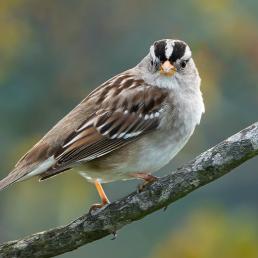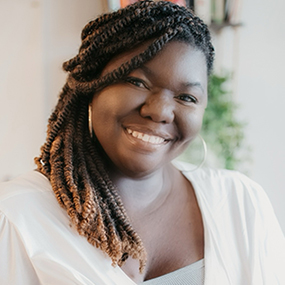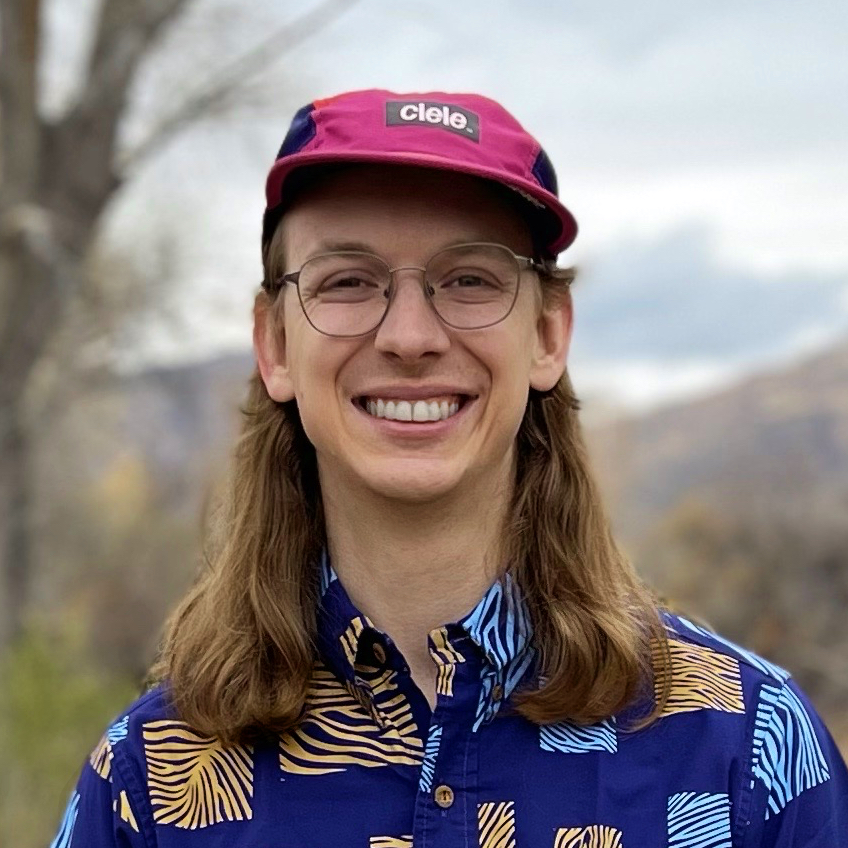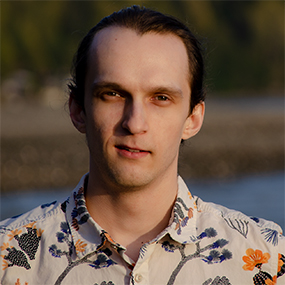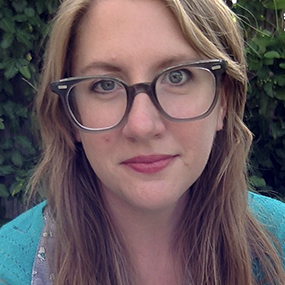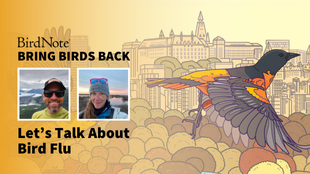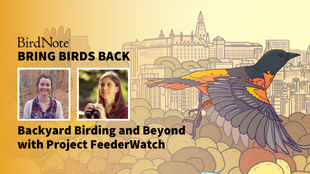

Join BirdNote tomorrow, November 30th!
Illustrator David Sibley and actor H. Jon Benjamin will face off in the bird illustration battle of the century during BirdNote's Year-end Celebration and Auction!
If we want as many people caring for birds as possible, we need people to not only become interested, but to have mentorship and community available for them. Tenijah speaks with Jeana Fucello and Kasia Chmielinski from the Feminist Bird Club, a birding group centered around being an inclusive, thoughtful home for birders who otherwise wouldn’t have community. The organization has chapters across the country and is continuing to grow and bring more people into its flock.
Tenijah Hamilton: Birdnote Presents
[Echoing Wingflaps SFX]
[Hopeful, energetic music with birdsong enters]
Tenijah Hamilton: This is Bring Birds Back. I’m Tenijah Hamilton.
We’ve all heard the saying before: “birds of a feather flock together.” And that’s cute and all, but while I might be a little flighty, I sure don’t have feathers—so what’s a girl gotta do to find her flock? You know what I mean though, right? Like how do I find my community? My people? I’m thinking of a cool group of rag-tag individuals with a slightly off-kilter sense of humor who go nerdy for Nightjars. I mean, where’s the bird group for disenchanted millennials who just want to wake up early and eat our avocado toast in defiance because we’ll probably never own a house but still want to be Purple Martin landlords?
Okay maybe those are a *bit* specific (seriously though, hit me up if it sounds like your thing) but the question remains—how do I find people with similar interests to mine to go birding with?
Well for this episode, I’m looking at how one organization is helping more people find their flock. I’m so excited to chat with leaders from the Feminist Bird Club, also known as the FBC. It’s an awesome organization that champions inclusivity and intersectionality in the bird world by intentionally creating a safe space for people, especially from marginalized communities. With chapters literally all around the country, and also a couple abroad, the Feminist Bird Club has a wide wingspan.
When I talk to people about birding, especially to my friends who are BIPOC, women, queer, gender diverse—a mix of all of the above, a lot of concern is about safety and about respect for their many identities and frankly, about sharing space with folks who have historically held the gate to keep them out.
[Hopeful music fades out]
So without further ado, I’m excited to introduce my guests Jeanna Fucello and Kasia Chmielinsky from the Feminist Bird Club. Thank you both so much for being here — can you tell our listeners who y’all are and what your role is for FBC?
Kasia Chmielinski: Yeah, absolutely. Uh, my name's Kasia Chmielinsky. I'm the co-founder of the Jersey City chapter of the Feminist Bird Club.
Jeana Fucello: And I'm, uh, Jeana Fucello. I am on the board of Feminist Bird Club and one of the event leaders for the New York city chapter.
Tenijah Hamilton: Awesome. Thank y'all both so much for being here. I'm curious, of course, just to start out about how you both got into birding.
Jeana Fucello: I have always really been interested in birds. I thought they were really cool and I would post pictures of them on Facebook a lot back in the day. And I would just be like, look at this guy. And then I posted, um, I think I posted a picture of a Cedar Waxwing and I was like, this bird is ridiculous. It has the audacity to have painted nails, even though it doesn't have hands. Like, what is this bird? And someone commented and was like, oh, we see those in Central Park. And I was like, what? Like, you can see these like around here? What? And, and so I like was like, all right, I'm going to do this.
Tenijah Hamilton: And so Jeana bought a cheap pair of binoculars and signed up for some bird outings. But she didn’t quite feel like she found her people…until she signed up for her first Feminist Bird Club outing.
Jeana Fucello: The person leading it was Kellie Quiñones, and she was so enthusiastic about it that I was like, oh, I get it. It makes me want to come out again to like, see what I have tomorrow.
Tenijah Hamilton: How about you, Kasia?
Kasia Chmielinski: I had moved from the West Coast to the East Coast and I was traveling a ton. Working a lot. And a friend of mine that I very much respect, who's just as nerdy as I am, was like, you might enjoy birdwatching. And I was like, I don't know. That sounds like old white people. No offense to any old white people who are listening to this. And she said, no, you really might. And so I, like, literally went outside and looked at some birds and I was like, I don't--nahh.
Tenijah Hamilton: But when Kasia borrowed their dad’s binoculars, things started to click.
Kasia Chmielinski: I work on computers all day. It got me outside and it got me looking at things and I felt very quickly the kind of rush that I had felt only from Pokemon Go, um—
Tenijah Hamilton: They're like real life Pokemon.
Kasia Chmielinski: Yeah. And the thing is like, I kinda liked Pokemon Go, but there were some like close calls on a bicycle. So I was like, no more Pokemon Go for Kasia.
But same idea, same joy, more joy, because they're real.
Tenijah Hamilton: And then, for the next few years, Kasia birded alone because like so many people, they just didn't quite know where to even find other birders. But then they ran across a piece online that really turned the tides.
Kasia Chmielinski: I think there was a New York Times article or something about Feminist Bird Club. And I was like, oh, I'm in the New York area now. So I joined one of the walks and I was like, oh, you can do this with other people.
Tenijah Hamilton: Can y'all tell me a little bit more about Feminist Bird Club? What is it and why does it exist? What's the mission?
Jeana Fucello: So the main mission of the club is to pair the fervor for bird watching with social justice. So we try to create a space where people can feel comfortable going birding with us because it's not always the most comfortable being alone in nature.
So it's very good to offer a space where people can come and one: not feel foolish for not knowing anything if they're brand new, and two: feel like they're protected by, like, the numbers that we have.
And it’s always my hope that people are meeting at our events and finding new friends and meshing with people because that's what happened to me. I think that that is one of the best things about the club is, like, finding your people.
Tenijah Hamilton: With a formula like that, there's no surprise that Feminist Bird Club is growing rapidly. FBC is national, with new chapters in places like DC, Tucson, and Houston. There are some chapters abroad too, like in the UK and the Netherlands.
Kasia Chmielinski: Well, we have a lot of enthusiasm. So enthusiasm will take you very far. And it turns out there are feminists and birdwatchers everywhere.
Tenijah Hamilton: Kasia lives in Jersey City, right across the Hudson River from Manhattan and Central Park. And they started to get to know the environment in Jersey City too.
Kasia Chmielinski: I'm learning so much every day about the way that we need to approach nature in urban areas. And I think Jersey has had some really toxic, uh, historical situations and scenarios. The Hackensack river, which is on the other side. So you have the Hudson on one side and the Hackensack on the other, one of the most polluted rivers in America. And it's the cleanest it's been in a hundred years now. So there's all these groups that are really local, that are focusing on kind of the intersection of the environment and community. But they do tend towards being older, whiter, male-er.
So we decided to start a chapter. It's not just me. It's myself and my co-leads, Harriet Bailey and Gabriela Figueredo, and we decided to just post something on Instagram. And the interest has just been kind of amazing.
I wouldn't say, that, like, any of the three of us are bird experts. And I think that's part of the joy, too, in creating something like this, is that you can start to interrogate and move away from some of these hierarchical structures that are also patriarchal. So this notion of: you go on a walk and there's one person who has all the information who's teaching everybody else—that in and of itself is a patriarchal system.
And so when you go on a walk and you're saying, hey, look, I am really excited to bring everybody together to explore this park. Yo, that's like very exciting, but also being able to say, I actually don't know the answers to everything.
I'm not able to tell you all the birds and what they eat and where they're coming from and where they're going. But we all have books and why don't we all learn it together? And I think that also is a kind of a paradigm shift that I'm super excited to be a part of.
Tenijah Hamilton: I love so much of what you just said. And that last point that you hit on about it being a paradigm shift is so important, right? It's so necessary to continue to kind of evaluate these structures that we're in and and thinking critically about it. And, you know, as somebody who is also not a bird expert, it's really fun and I think welcoming to others and be like, look, this is what I know. You can fill up so many more books with things I don't know, like let's learn together. It's a good model.
Kasia Chmielinski: Like all gulls. What even are gulls? They are all just one bird to me. I'm sorry to say this. I'm just going to come out and say this, but like, I need help with gulls, right? So someone bought a gull book and we were standing there frigid like a few weeks ago, just looking at this book, being like, oh, I don't know, which one do you think it is? You know? And there's so much joy in that too. And when you finally have done the identification and you get a picture, you send it to somebody on a WhatsApp group and then you get a confirmation later. Like actually, yeah, you're looking at the right markings. You're looking at the right things. Um, that feels amazing, right? That's like, um, being in school again, but like the good parts.
Jeana Fucello: Yeah. I don't want anybody on any of our events to feel like they can't ask questions or that it's, it's like, oh, it's a stupid question, but what is this? And I'll be like, that's a cardinal. It's a cool bird. There was actually a woman in Central Park who stopped us and was like, what is this bird? I took a picture of it on my phone. And it was a cardinal. And she was like, I'm from Brazil. Like, I don't know anything about this. So you can't assume anything about anybody's knowledge base. The last thing I want to hear is that somebody didn't feel like they were included or someone didn't feel like they were being heard or anything like that.
Kasia Chmielinski: Can I say something about that? Because I feel like it's so important. That notion of a sense of belonging. And, you know, my background is, I studied science. And as an undergraduate, who at the time was female identified, now I identify as nonbinary, but I was in a program that wasn't particularly supportive at the time.
The university president at the time was saying that women maybe, biologically, were not as good at doing science as other people. And so I left the sciences. And I always kind of, um, am interested in the studies that have come out since just showing that it's not actually about having expertise that encourages you or makes you feel like you should stay in something. It's actually about feeling like you belong.
I think I was no less or more intelligent when it came to science, but because I didn't feel like I belonged, I left. And I think that's always stuck with me. And I think it translates across sciences or nature, or when you're in a workplace or, you know, if you're a musician or whatever it is, right?
Any kind of club or interest, if you don't feel like you belong, then you'll leave that thing. And I think you can say the converse too, which is, if you don't see a group where you think you're going to belong, you won't join, right? And so I think it's really, really important to kind of double down on that, that absolutely birding can be a competitive sport.
[Dramatic but hopeful music enters]
It is expertise-based for a lot of people, that you do grow in your expertise as you learn things. But without the sense of belonging, right, it's not worth it. And I think a lot of people who don't see themselves in those communities won't stay.
Tenijah Hamilton: We're going to take a quick break, but when we get back, we'll dive a little deeper into who the Feminist Bird Club is for, how they’re disrupting typical the usual model for birding trips, and what kind of shenanigans you can look forward to on an FBC trip. Stick around.
[Dramatic but hopeful music fades out]
[MIDROLL AD BREAK]
Tenijah Hamilton: This is Bring Birds Back. I’m talking to two leaders from the Feminist Bird Club. And, Jeana and Kasia want to be really clear about what the word feminist means to their organization.
Jeana Fucello: You know, the concern is that a lot of people see the word feminist and they immediately think white feminism, which is not what we're about at all. We try to be an inclusive space for not just women, but also LGBTQ people and BIPOC people. It's for anybody who feels like they would feel uncomfortable going out by themselves.
Tenijah Hamilton: It seems like in what I'm hearing, and definitely correct me if I'm wrong, but it feels like anybody who wants kind of entry into this space you have to be kind of willing to interrogate all of those things and where you stand in relation to these communities. So if you're somebody who has—who comes from a background that has traditionally had power, maybe that's the man, maybe that is a white person, like you have to be willing to interrogate: what does my showing up in this space mean, how am I interacting? Am I amenable to, you know, not being centered in this situation, which seems important. And it's pretty radical in this space.
Kasia Chmielinski: I think Jeana said it really well. I think it's for folks who don't necessarily feel comfortable in other birding groups outside in nature, maybe around sciences or natural exploration in this way. But I want to come back to this idea of the word feminist being a signal.
It's like the bat signal, but it's like the bird signal. I think in a way, the word feminist allows you to have those conversations. It's in the name, right? So if you've done something that is going to be in violation of that as a belief system, or as an ideal, then you can fall back on that word and that title and say: hey, this is not okay for these reasons and we were really up front about it to begin with. We've also gone super local and tried to build relationships with community organizations that have been here for a lot longer than we have and know the community a lot better and, you know, can help us understand what the needs are.
So we're kind of invested in getting to know people in each of the parks who are planting native plants or the city journalers, or, um, you know, there’s a group called Jersey City Birders, and they've been birding in certain areas. And we recently were approached by the local 4-H of Hudson County who wants to bring kids into natural spaces in the city, because there's just such a dearth of programming for kids. And so we're going to do that. And it's like, we'll just kind of be a part of these community events and help to collaborate and show up and volunteer and yeah, we're feminists. Okay, right. But in a way, it just normalizes it. And what I hope is that when we run this summer camp that we're going to be running this summer that we're really excited about, that these kids aren't going to think about feminism. They're just going to think those people were great. And we learned a lot about birds and oh, now maybe I associate the word feminist with like great people who are friendly, where I felt comfortable. So I think there's also that aspect of it, which is that it's a signal, but also I hope it, it gets a little bit normalized — cause there's a bad taste about that word sometimes.
And I think it's really unfortunate. And I hope that we can help to mitigate that and actually show the positive sides of this kind of approach.
Tenijah Hamilton: Absolutely. Something that I think a lot of people in the birding community, especially people who are trying to shift these paradigms, who are doing kind of this more radical work, you hear a lot about like, you should leave identity politics out of things like birding. Like why, why, why are you making this a thing? So what you or would you say to people kind of go along that line of thinking.
Kasia Chmielinski: I think that there's like this assumption of neutrality that nature or the natural world or these hobbies, are neutral. And that somehow by talking about the experiences of folks of color or the name of the club, or all of the kinds of ancillary or even intersectional topics that come up, that we're somehow making it not neutral.
And I think that the reality is that it's not neutral anyway. So we're just trying to shed light on that and highlight the ways in which we believe that things are neutral. We've been taught that things are neutral, whether it's the names of the birds or the way that we lead our groups, or power. The power of naturalists of people who are public figures. Um, the power of institutions like the Sierra Club or Audubon or any of these, right?
Tenijah Hamilton: We talked about this a couple of episodes ago with regard to bird names. Like, how birds have been named in honor of people who were outspoken white supremacists — that’s not neutral for people of color learning about those birds. And similarly, all the unquestioned assumptions of how a birding event is run — those are things the Femenist Bird Club is trying to disrupt.
Tenijah Hamilton: So if I was to go on a Feminist Bird Club event, what can I look forward to? What kind of events do y’all do?
Jeana Fucello: We're just going to have a nice time together and whatever that brings, it brings. Like, if we see a bird like a starling taking a bath, we're going to get excited about it, 'cause it's real cute when they take little baths. Um, so that, that's the energy that I try to bring to the ones that I lead in the very least.
During the pandemic, we did a lot of online stuff too. We did a female bird ID one, which was very fun and informative. It's super empowering once you're able to get those and it makes you a better birder.
And we would like to extend the club past any kind of physical borders. 'Cause there are many disabled people who are taking an interest in birds, too.
Kasia Chmielinski: I hope it's really welcoming. I hope that people learn things.
So we'll talk about not just, you know, who has historically been on that land, but also about the companies and the toxic cleanups and the, kind of, disagreements or fights that have taken place in order to make this place where the way it is today so that people are also contextualized.
[Quietly hopeful music enters]
Tenijah Hamilton: Thank you both so much for your time. This was really great and super informational.
Kasia Chmielinski: Thank you for having us. This was a fun conversation.
Jeana Fucello: Yeah it was so fun.
Tenijah Hamilton: The Feminist Bird Club has chapters across the US. You can find links to all of those, as well as some other cool birding affinity groups at our website, BirdNote.org.
Bring Birds Back is produced by Mark Bramhill and me, Tenijah Hamilton. Sam Johnson is our production assistant. We're edited by Oluwakemi Aladesuyi and Allison Behringer of Rough Cut Collective. Our fact checker is Conor Gearin. Our Content Director is Allison Wilson. Scoring is by Cosmo Sheldrake and Blue Dot Sessions. Special thanks to Viki Merrick and Rehka Murthy.
[Quietly hopeful music ends]
######################
MUSIC:
“Dawn Chorus” and “Evening Chorus” by Cosmo Sheldrake
“Dirty Wallpaper” by Blue Dot Sessions
About guest Jeana Fucello:
Jeana Fucello (she/her) works for Warner Brothers Discovery by day, and birds also by day, but earlier. She is a board member of Feminist Bird Club, and leads outings for new birders in Central Park, Prospect Park, Greenwood Cemetery and close to home in Astoria Park. Aside from managing and sending out the patches from FBC’s annual patch sale, she works hard to pass on her deep appreciation for birds and nature through the mediums of song and tears.
About guest Kasia Chmielinski:
Kasia Chmielinski (they/them) is the co-founder of the Feminist Bird Club of Jersey City, a local chapter of a national bird-watching organization dedicated to promoting inclusivity in birding and providing opportunities for all communities to connect with the natural world. When not birding, Kasia manages and designs technology that encourages the development of ethical artificial intelligence.
